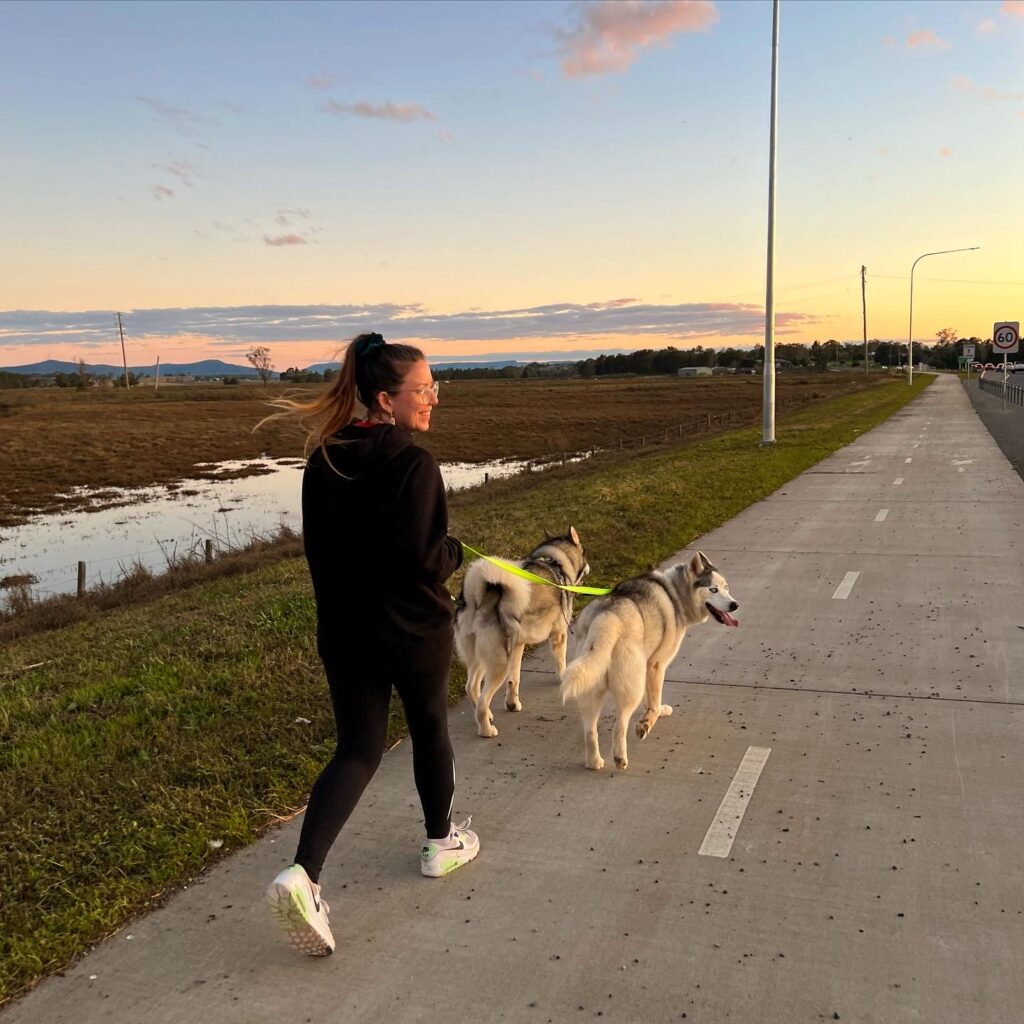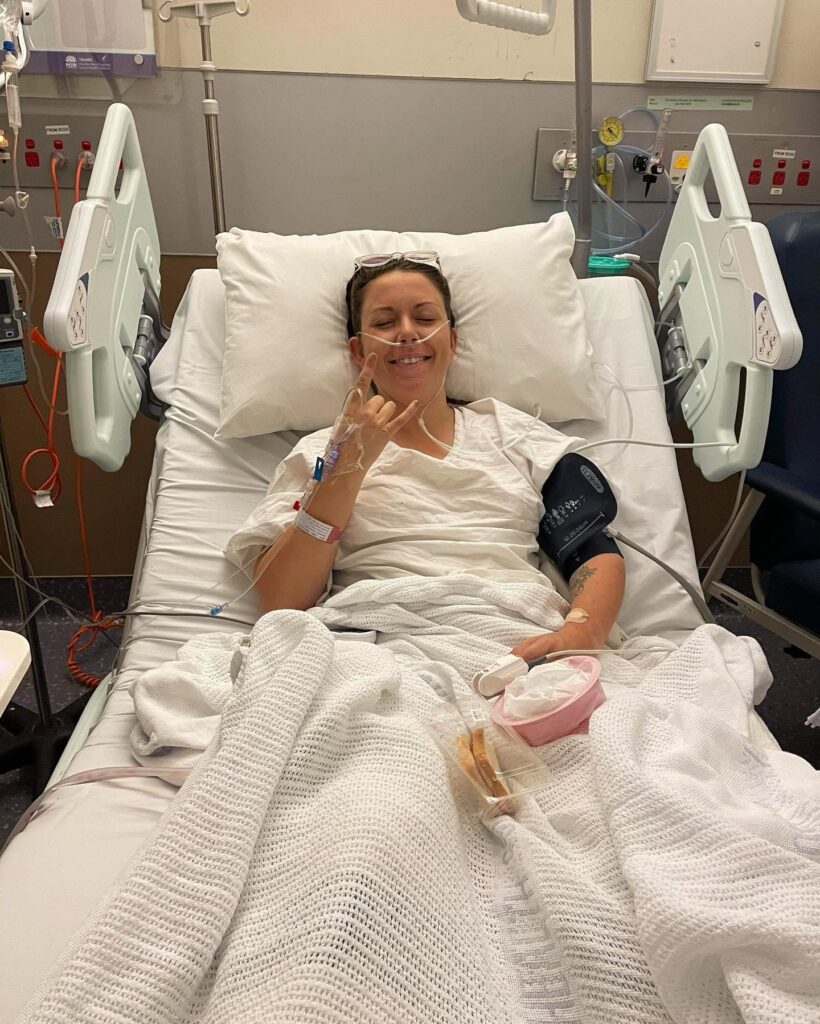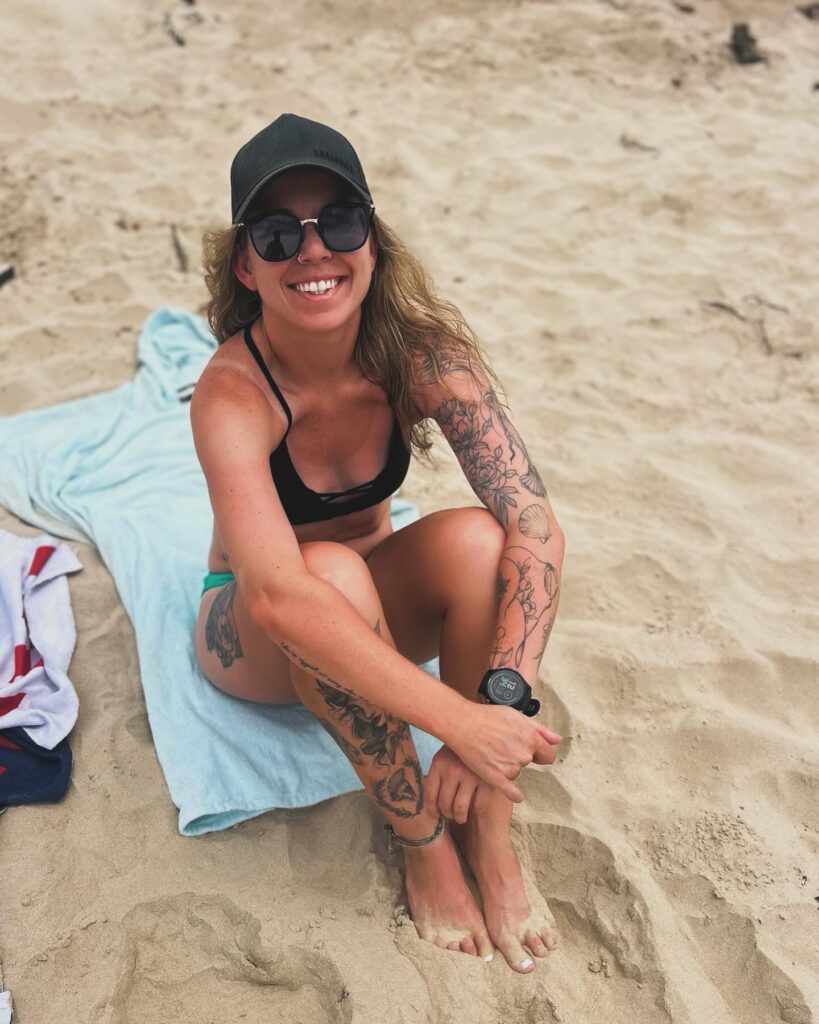“Not letting it define me was massive” – Chloe’s story

It took quite a long time for me to be diagnosed.
I was 16 when I was diagnosed with Crohn’s disease, but I had been unwell for about 12 months.
My mum’s also got Crohn’s disease but – when I was diagnosed – it wasn’t super common or well known. As part of the diagnosis process, we had to eliminate everything besides IBD. I went on elimination diets, investigated Celiac disease – which is also in the family – and tested for every other digestive condition you could think of. I was eventually diagnosed via a scope. My bowel was so damaged that they couldn’t get the scope all the way through. I was pretty crook by the end of it.
My symptoms started with excruciating pain after eating as well as nausea and vomiting. I didn’t have the classic, lower digestive symptoms that I get now. I lost a lot of weight and got down to a scarily low weight before the diagnosis. They tried aggressive steroid therapy, and I had an emergency bowel resection shortly after.
I was fortunate to have a brilliant gastroenterologist during and following my diagnosis. Sadly, he’s passed away now, but he was both my mum’s and my gastro. Mum’s disease was very similar to mine – it was quite treatment-resistant – so I spent a lot of my childhood in hospital with her. We both kind of knew that I likely Crohn’s disease, but we needed that definitive answer. Following the diagnosis, my main clinical support was through my gastro. I didn’t have any dietetic input, but I had psych input and school counseling after the resection. I missed most of year 11, which was pretty hectic.
I also had a pretty good support network. My friends were awesome – they all learned what Crohn’s was after I was diagnosed which was really awesome. I was also lucky that my mum knew all about it. She was involved with Crohn’s and Colitis Australia when it first started with Angela McAvoy.
I was quite lucky in that regard, but it was still pretty full on. Especially recovering from major surgery when I was essentially still a kid.
I’ve made a point of maintaining close relationships with all the gastroenterologists that I’ve had.
This was really important in transitioning from pediatric to adult care. I’m also fortunate to have a great GP. I will always advocate for everyone to find a GP that they’re happy with. If not, move on to someone new if they’re not a good fit.
I’ve moved around Australia a fair bit, and I’ve continued to be well supported. Not so much in the hospital system – I do find that a lot more challenging. Moreso regarding my primary care with my GP and my gastro. I can contact my gastro or his IBD nurse at any time if I need to.
I’ve gone through over 20 surgeries following the diagnosis, and Crohn’s Disease has affected every part of my day-to-day life.
It really does.
There’s almost a life before, and a life after.
I work in healthcare, but I can’t work full time. I’ve had extended periods off work. I’ve had employers not understand the modifications that I need, which is a bit scary. I’ve worked in hospitals for years, and if the health professionals aren’t getting it, it’s a bit of a worry. I’ve used up my house deposit a couple of times on medication, treatment, scans and everything else. We’re lucky that we finally got into the housing market about two years ago, but I felt like I fell a bit behind everyone my age in that regard.
Career wise as well. I’ve ticked some good goals, but it’s taken me a lot longer. Same with my fitness goals. I’m training for a half marathon. It feels like it’s 10 times the effort compared to all my mates who are training with me. With fatigue and nutrition, my body uses a lot of energy when the disease is active. Trying to train alongside that has been challenging at times.
Regarding my personal relationships, I’m very lucky to have an extremely supportive partner. He’s a legend. But that’s been challenging in the past, especially with the unpredictability of the disease. You can be fine one day, and in hospital with an obstruction on the next. Not being able to contribute financially as much as I would like also affects relationships. I’m also lucky to have an awesome friendship group, but I have lost friends in the past.
I haven’t been able to get out and do things, and I’ve had to cancel at the last minute because I’m stuck on the toilet. It has a big impact on relationships.

I’ve been an exercise physiologist for nine years now.
Exercise has played a huge role in my overall wellbeing. Staying active really helps me bounce back quicker when I’m having a flare or if I’ve had an acute obstruction. Maintaining a base level of fitness really helps. We also know that being sedentary is a huge risk for chronic disease, and that having one chronic disease is a predisposing risk factor for other chronic diseases.
Exercise can be a protective factor. That’s been really motivating for me. I was rehabbed by a physio for my first surgery, then an exercise physiologist. They showed me that rehab is very hard, but you can get back to doing things that you want. They got me back to playing soccer and being active. That was a big help from a physical point of view. In terms of mental health, there’s so many ways that exercise is helpful. It’s the most underutilised and easily accessible antidepressants that there is.
If you move, you do tend to feel better in the short term. And if you’re having a shitty day, getting out and moving – or moving at home – really can help. Sometimes it feels like it’s the last thing you want to do, but it’s important.
There’s also the social aspect of exercising. It might be saying hello to someone on a walk in the morning. This disease can be so isolating, and it can be the only interaction one might have for the day. There’s so many ways that exercise is beneficial. It keeps me moving in preparation for being unwell. It helps me bounce back, while keeping me feeling more levelheaded.
I try to exercise as soon as possible after surgery.
My surgeons treat pre-surgery like training for a sporting event. They try and get me as fit and active as I can, knowing that there’s a long period where I essentially can’t do anything.
For eight weeks following a recent operation, I couldn’t lift anything over a kilo. But I could walk everywhere. We know that getting up and moving post op is more beneficial than being bedridden. It helps to mitigate the risk of clots and that sort of stuff.
The usual recommendation from my surgeons is to get up and move as early as possible – and gradually increasing the load as tolerated – while still listening to my body.
I reckon I’ve heard every anecdote about Crohn’s that’s been grossly misinformed.
I laugh about it now, but I used to get pretty upset about it when I was younger because people just didn’t get it. Now I’m okay with the fact that they probably never will understand. That’s fine, because it means they don’t have it. I don’t want anyone to go through this. But I’ve heard everything. From “cut this out of your diet and you’ll be fine,” to “it must be something to do with your lifestyle that’s caused it.”
I’ve also been told that it’s the same as IBS. Not to be a discredit anyone with IBS – but it gets mixed up all the time. I get a real bee in my bonnet about that sometimes. People will also compare different people with IBD. Some people have a milder form of disease. Someone will say, “I know someone who has that. You just can’t eat this, and you’ll be fine.” One of the biggest misconceptions is how variable it can be. Someone can be well, then suddenly, they can be really unwell.
Because I’m so active, I also hear the cliché, “you don’t look sick.” Behind closed doors, I’m very unwell at times. I still force myself to get out and about. It’s a common refrain that drives a lot of people with Crohn’s and colitis crazy – that you don’t look sick.

My mum was a big role model for me.
She was critically unwell with Crohn’s, and there wasn’t as much information about it when she was diagnosed.
I think being aware of who’s in your community – even if it’s online –knowing that you’re not alone, and that you can have a fulfilling life alongside this illness is so important. Not letting my illness define me was also massive.
I think I got very deep into Crohn’s disease being part of my identity for a long time. Now it’s more of an unwanted friend that I live with every day. You don’t have to become your diagnosis. There’s so much more to life outside of that. You might have to adjust, but you don’t have to miss out on everything.
Another big thing is to not neglect your mental health. We get really focused on managing physical symptoms. But the mental aspect needs to be taken just as seriously.